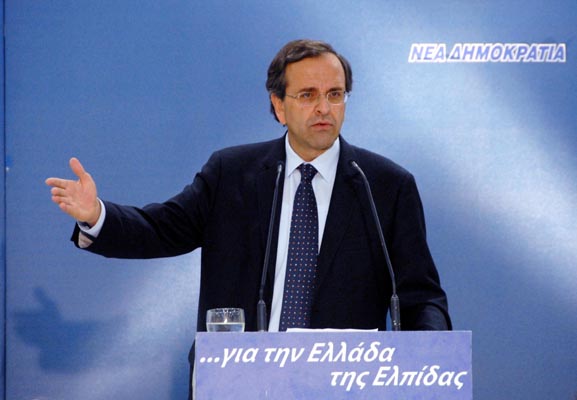.

Antonis Samaras (Greek: Αντώνης Σαμαράς, pronounced [anˈdonis samarˈas]; born 23 May 1951) is a Greek economist and politician who has been Prime Minister of Greece since 20 June 2012.[1] He has been leader of New Democracy, Greece's major conservative party, since 2009. Previously, Samaras served as Minister of Finance in 1989, then as Minister of Foreign Affairs from 1989 to 1990 and again from 1990 to 1992. Later, he was Minister of Culture in 2009.
Samaras was known for a 1993 controversy in which he effectively caused the New Democracy government, of which he was a member, to fall from power. In spite of this he rejoined the party in 2004 and was elected to its leadership in a closely fought intra-party election in late 2009.[2] He is the 7th leader of the party since it was founded in 1974.
Early life and education
Born in Athens, Samaras attended school in the Athens College (founded by his maternal great-grandfather, Stefanos Delta, and Emmanouil Benakis, Delta's father-in-law), and graduated from Amherst College in 1974 with a degree in economics, and then from Harvard University in 1976 with an MBA. He is the son of Dr. Konstantinos Samaras, who was a Professor of Cardiology, and Lena, née Zannas, a maternal granddaughter of author Penelope Delta. His brother, Alexander, is an architect. His paternal uncle, George Samaras, was a long-standing member of Parliament for Messenia in the 1950s and 1960s.
Samaras and former Prime Minister George Papandreou were dormitory roommates during their student years at Amherst College, but became bitter political rivals.[3]
Antonis Samaras at EPP Summit June 2010
Early career
Samaras was elected a Member of Parliament for Messenia from 1977 onwards. In 1989 he became Finance Minister, later becoming Minister for Foreign Affairs in the New Democracy government of PM Konstantinos Mitsotakis (1989–1992), advocating a hard line on the "Macedonian Question". After being removed from his post in 1992 over this issue, Samaras founded his own party, "Political Spring" [Greek: Πολιτική Άνοιξη], located politically to the right of New Democracy. The defection of one Member of Parliament from New Democracy to Samaras' party caused the government's fall from power in 1993.
Political Spring gained 4.9% of the vote in the 1993 general election, earning ten seats in the Greek Parliament. They gained 8.7% in the elections in the 1994 European Parliament elections, earning two seats. Its decline started in the 1996 general election, when it gained 2.94%, just below the 3% threshold necessary to enter parliament. They participated in the 1999 European Parliament elections, but only got 2.3%, which was not enough to elect MEPs.
Political Spring did not participate in the 2000 general election, and Samaras publicly supported the New Democracy party. Before the 2004 general election, Samaras dissolved his party, rejoined New Democracy and he was elected a MEP in the 2004 European elections.
In the 2007 Greek legislative election he was elected to the Greek Parliament for Messenia, and consequently resigned from the European Parliament. In January 2009 he was appointed Minister for Culture following a government reshuffle. In this capacity he inaugurated the new Acropolis Museum in July 2009. He was reelected in Messenia in 2009.
New Democracy
After New Democracy resoundingly lost the 2009 legislative election, Kostas Karamanlis resigned as head of the party, prompting a leadership race, and Samaras ran for the post. Early polls showed he was running neck and neck with the perceived initial favorite Dora Bakoyanni, the former Foreign Minister and former Athens mayor.[4] Shortly thereafter, another leadership candidate, former Minister Dimitris Avramopoulos announced he was resigning his candidacy and would support Samaras instead. In a break with previous practice, an extraordinary party congress resolved that the new leader would be elected by party members in a countrywide ballot. Samaras' candidacy soared in opinion polls and finished the race as a favorite.
In the early morning hours of 30 November 2009, Samaras was elected the new leader of the New Democracy party.[5][dead link] Following early results showing Samaras in a comfortable lead, Bakoyanni, his main rival, conceded defeat and called Samaras to congratulate him. He accepted his election with a speech at the party headquarters, and pledged to carry out a broad ideological and organizational reform, aspiring to regain majority status.
He was later instrumental in the expulsion of Ms. Bakoyanni (May, 2010) for defying the party line and voting for an austerity measure required for European Union-International Monetary Fund backed lending.
Prime Minister
Following the May 2012 legislative election where the New Democracy party became the largest party in the Hellenic Parliament, Samaras was asked by Greek President Karolos Papoulias to try to form a government.[6] However, after a day of hard negotiations with the other parties in Parliament, Samaras officially announced he was giving up the mandate to form a government. The task passed to Alexis Tsipras, leader of the SYRIZA (the second largest party) who was also unable to form a government.[7] After PASOK also failed to negotiate a successful agreement to form a government, emergency talks with the President ended with a new election being called while Panagiotis Pikrammenos was appointed as Prime Minister in a caretaker government.
Voters once again took to the polls in the widely-watched June 2012 election. New Democracy came out on top in a stronger position with 129 seats, compared to 108 in the May election. On 20 June 2012, Samaras successfully formed a coalition with PASOK (now lead by former Finance Minister Evangelos Venizelos) and DIMAR.[8] The new government would have a majority of 58, with SYRIZA, Independent Greeks (ANEL), Golden Dawn (XA) and the Communist Party (KKE) comprising the opposition. PASOK and DIMAR chose to take a limited role in Samaras' Cabinet, being represented by party officials and independent technocrats instead of MPs.[9]
References
^ "Antonis Samaras sworn in as new Greece prime minister". BBC. 20 June 2012. Retrieved 20 June 2012.
^ "ND heads for tense election showdown". Kathimerini. 30 November 2009. Retrieved 30 November 2009.
^ "As good as it gets". ekathimerini. 4 December 2009. Retrieved 8 December 2009.
^ "Bakoyannis Holds Slim Lead in Greece’s ND Race". Angus Reid. 1 November 2009. Retrieved 6 November 2009.
^ "Antonis Samaras is the new ND leader". Athens News Agency (in Greek). 30 November 2009. Retrieved 30 November 2009.
^ "Samaras tries to form Greek coalition". Rthk.hk. Retrieved 14 May 2012.
^ Petrakis, Maria. "Greek Government Mandate to Pass to Syriza as Samaras Fails". Bloomberg. Retrieved 14 May 2012.
^ "Antonis Samaras". Retrieved 2012-06-20.
^ "PM Antonis Samaras announces cabinet". 2012-06-21. Retrieved 2012-06-22.
| Ancient Greece
Science, Technology , Medicine , Warfare, , Biographies , Life , Cities/Places/Maps , Arts , Literature , Philosophy ,Olympics, Mythology , History , Images Medieval Greece / Byzantine Empire Science, Technology, Arts, , Warfare , Literature, Biographies, Icons, History Modern Greece Cities, Islands, Regions, Fauna/Flora ,Biographies , History , Warfare, Science/Technology, Literature, Music , Arts , Film/Actors , Sport , Fashion --- |
All text is available under the terms of the GNU Free Documentation License



